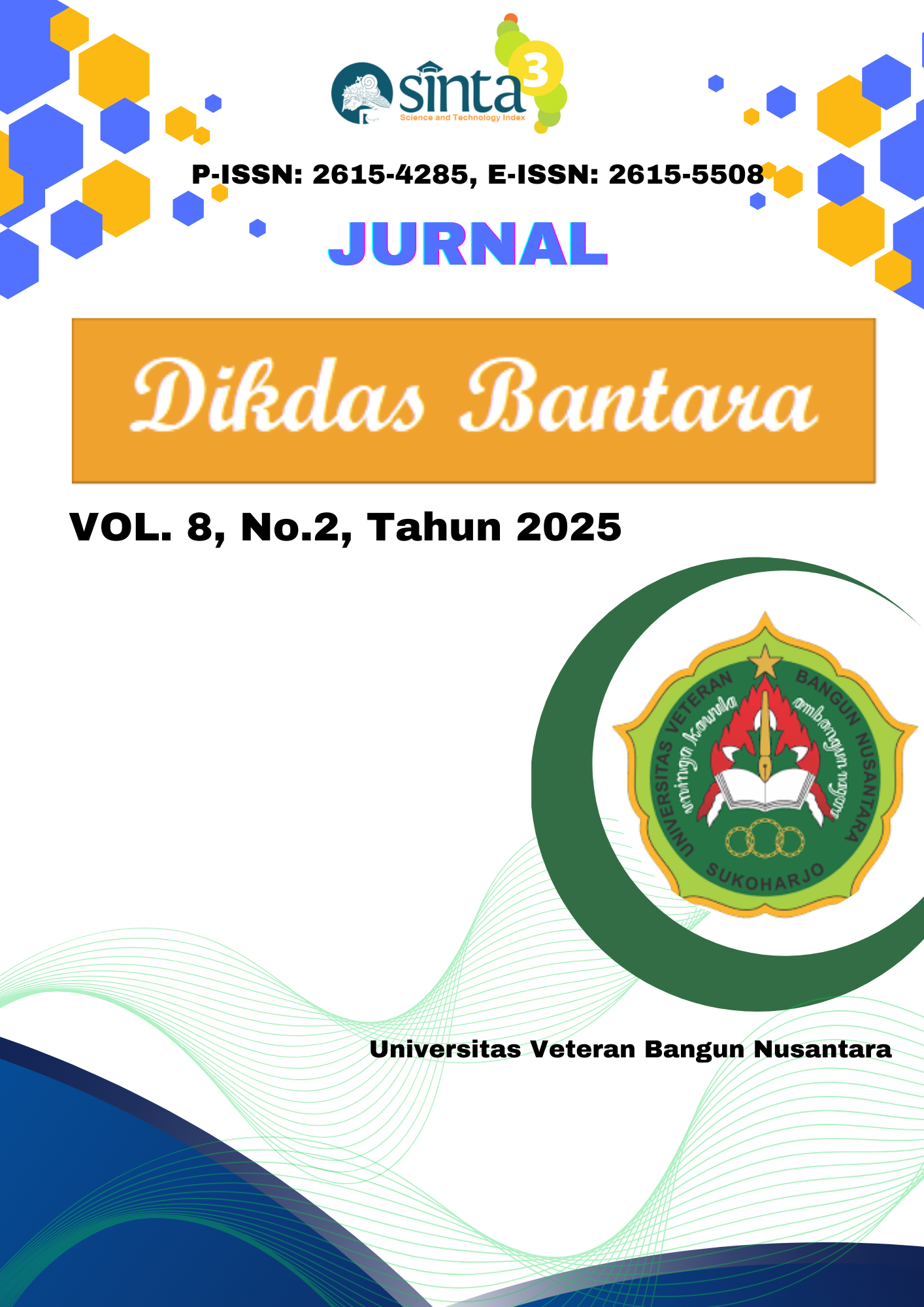THE EFFECT OF PROJECT-BASED LEARNING (PJBL) BASED ON ETHNOMATHEMATICS ON THE NUMERACY LITERACY ABILITY OF STUDENTS AT ELEMENTARY SCHOOL PATUK II GUNUNGKIDUL, YOGYAKARTA
DOI:
https://doi.org/10.32585/dikdasbantara.v8i2.7209Abstract
This study aims to determine the effect of the ethnomathematics-based PJBL learning model on improving students' numeracy literacy skills in reading and writing numbers at Patuk II Public Elementary School, Gunungkidul. This research was motivated by students' low numeracy literacy skills, characterized by difficulty understanding basic mathematical concepts and low interest in learning. The research method used was quantitative with a one- group pretest-posttest design. The study sample involved 18 fourth-grade students at Patuk II Public Elementary School, Gunungkidul. Data were collected through observation, testing, and documentation. The research instrument consisted of essay questions designed to measure students' numeracy literacy, specifically on the topic of plane figures related to the local cultural context. The results showed that the implementation of ethnomathematics- based PJBL significantly improved students' numeracy literacy skills. The average pretest score of 46.39 increased to 84.33 in the posttest. Hypothesis testing using a paired sample t-test yielded a significance value of 0.000 (<0.05), indicating a significant difference between the pretest and posttest results. Thus, it can be concluded that the ethnomathematics-based PJBL model is effective in improving elementary school students' numeracy literacy skills.
Downloads
Downloads
Published
Issue
Section
License
Copyright (c) 2025 Hengkang Bara Saputro, Lusi Oktavia

This work is licensed under a Creative Commons Attribution-ShareAlike 4.0 International License.
The copyright to this article is transferred to Jurnal Dikdas Bantara if and when the article is accepted for publication under Creative Commons Attribution-ShareAlike 4.0 International License. The undersigned hereby transfers any and all rights in and to the paper including without limitation all copyrights to Jurnal Dikdas Bantara. The undersigned hereby represents and warrants that the paper is original and that he/she is the author of the paper, except for material that is clearly identified as to its original source, with permission notices from the copyright owners where required. The undersigned represents that he/she has the power and authority to make and execute this assignment.We declare that:
1. This paper has not been published in the same form elsewhere.
2. It will not be submitted anywhere else for publication prior to acceptance/rejection by this Journal.
3. A copyright permission is obtained for materials published elsewhere and which require this permission for reproduction.
Furthermore, I/We hereby transfer the unlimited rights of publication of the above-mentioned paper in whole to Jurnal Dikdas Bantara. The copyright transfer covers the right to reproduce and distribute the article, including reprints, translations, photographic reproductions, microform, electronic form (offline, online), or any other reproductions of similar nature. The corresponding author signs for and accepts responsibility for releasing this material on behalf of any and all co-authors. After submission of this agreement signed by the corresponding author, changes of authorship or in the order of the authors listed will not be accepted.
Retained Rights/Terms and Conditions
1. Authors retain all proprietary rights in any process, procedure, or article of manufacture described in the work.
2. Authors may reproduce or authorize others to reproduce the work or derivative works for the author’s personal use or for company use, provided that the source and the Jurnal Dikdas Bantara copyright notice are indicated, the copies are not used in any way that implies Jurnal Dikdas Bantara endorsement of a product or service of any employer, and the copies themselves are not offered for sale.
3. Although authors are permitted to re-use all or portions of the work in other works, this does not include granting third-party requests for reprinting, republishing, or other types of re-use.



















